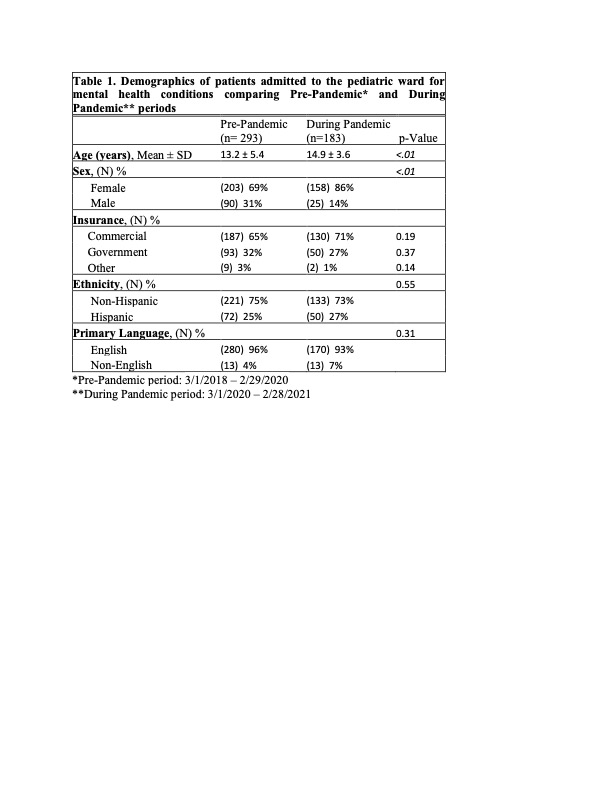Hospital Medicine: Systems/Population-based Research
Category: Abstract Submission
Hospital Medicine: Systems/Population Health
141 - Epidemiology of Pediatric Hospital Medicine Admissions Related to Mental Health Diagnoses During Early COVID-19 Pandemic
Monday, April 25, 2022
3:30 PM - 6:00 PM US MT
Poster Number: 141
Publication Number: 141.416
Publication Number: 141.416
Esther Jun-Ihn, UCLA Mattel Childrens Hospital, Los Angeles, CA, United States; Elayna Ng, UCLA, Los Angeles, CA, United States; Deepa Kulkarni, University of California, Los Angeles David Geffen School of Medicine, Los Angeles, CA, United States; Nicholas Jackson, University of California, Los Angeles David Geffen School of Medicine, Los Angeles, CA, United States; Derek C. Pham, University of California, Los Angeles David Geffen School of Medicine, San Marcos, CA, United States

Esther Jun-Ihn, MD
Clinical Instructor
UCLA Mattel Childrens Hospital
Los Angeles, California, United States
Presenting Author(s)
Background: Pediatric mental health has become a rising concern given the social isolation, disruption of activities, and psychological trauma brought about by the COVID-19 pandemic. There has been a trend of increased mental health visits to the emergency department and outpatient settings, most notably with depression and suicidality/self-harm.
Objective: In this study, we aim to describe the epidemiology of admissions to the pediatric ward related to mental health diagnoses during the first year of the pandemic and how it compares to prior years.
Design/Methods: We performed a retrospective chart review of all pediatric ward admissions to our center from March 1, 2018 to February 28, 2021. We reviewed the first three admission ICD-10 diagnoses to determine whether the primary diagnoses were related to mental health; specifically self-harm/suicidality, acute aggression and psychosis, eating disorders, or other mental health/behavior related diagnoses. Differences between pre-pandemic (3/1/2018 – 2/29/2020) and during pandemic (3/1/2020 – 2/28/2021) years were compared using χ2, Fisher's Exact, two-sample t-tests, and regression models as appropriate.
Results: Patients admitted with mental health diagnoses were older (13.3 years vs 14.9 years, p < 0.01) and more likely to be female (69% vs 86%, p< 0.01) during the pandemic period (Table 1). Although total admissions decreased (n=293 vs n=183), the proportion of mental health related admissions increased from 3.5% of pre-pandemic admissions to 6% of pandemic period admissions (p < 0.01). The differences increased as the pandemic continued (Figure). Admissions related to eating disorders were significantly increased during the pandemic period (44.4% vs 61.7% of total mental health admissions, p< 0.01), with no change or a decrease in other mental health related disorders (Table 2). Conclusion(s): Our study found an increase in the proportion of mental health admissions to the pediatric ward during the first year of the pandemic, with older females impacted more than prior years. The most significant increases were seen 8 months into the pandemic and beyond. The proportional increase appeared to be largely driven by admissions related to eating disorders. We present this data to support the effects of the pandemic on pediatric mental health that has been described in outpatient contexts, and to encourage continued research in this area with emphasis given to children with eating disorders.
Figure.jpg) Proportion of admissions to the pediatric ward related to mental health diagnoses by month (Pre-Pandemic: March 2018 to February 2020 vs During Pandemic: March 2020 to February 2021).
Proportion of admissions to the pediatric ward related to mental health diagnoses by month (Pre-Pandemic: March 2018 to February 2020 vs During Pandemic: March 2020 to February 2021).
Table 1 Demographics of patients admitted to the pediatric ward for mental health conditions comparing Pre-Pandemic* and During Pandemic** periods
Demographics of patients admitted to the pediatric ward for mental health conditions comparing Pre-Pandemic* and During Pandemic** periods
Objective: In this study, we aim to describe the epidemiology of admissions to the pediatric ward related to mental health diagnoses during the first year of the pandemic and how it compares to prior years.
Design/Methods: We performed a retrospective chart review of all pediatric ward admissions to our center from March 1, 2018 to February 28, 2021. We reviewed the first three admission ICD-10 diagnoses to determine whether the primary diagnoses were related to mental health; specifically self-harm/suicidality, acute aggression and psychosis, eating disorders, or other mental health/behavior related diagnoses. Differences between pre-pandemic (3/1/2018 – 2/29/2020) and during pandemic (3/1/2020 – 2/28/2021) years were compared using χ2, Fisher's Exact, two-sample t-tests, and regression models as appropriate.
Results: Patients admitted with mental health diagnoses were older (13.3 years vs 14.9 years, p < 0.01) and more likely to be female (69% vs 86%, p< 0.01) during the pandemic period (Table 1). Although total admissions decreased (n=293 vs n=183), the proportion of mental health related admissions increased from 3.5% of pre-pandemic admissions to 6% of pandemic period admissions (p < 0.01). The differences increased as the pandemic continued (Figure). Admissions related to eating disorders were significantly increased during the pandemic period (44.4% vs 61.7% of total mental health admissions, p< 0.01), with no change or a decrease in other mental health related disorders (Table 2). Conclusion(s): Our study found an increase in the proportion of mental health admissions to the pediatric ward during the first year of the pandemic, with older females impacted more than prior years. The most significant increases were seen 8 months into the pandemic and beyond. The proportional increase appeared to be largely driven by admissions related to eating disorders. We present this data to support the effects of the pandemic on pediatric mental health that has been described in outpatient contexts, and to encourage continued research in this area with emphasis given to children with eating disorders.
Figure
.jpg) Proportion of admissions to the pediatric ward related to mental health diagnoses by month (Pre-Pandemic: March 2018 to February 2020 vs During Pandemic: March 2020 to February 2021).
Proportion of admissions to the pediatric ward related to mental health diagnoses by month (Pre-Pandemic: March 2018 to February 2020 vs During Pandemic: March 2020 to February 2021).Table 1
 Demographics of patients admitted to the pediatric ward for mental health conditions comparing Pre-Pandemic* and During Pandemic** periods
Demographics of patients admitted to the pediatric ward for mental health conditions comparing Pre-Pandemic* and During Pandemic** periods